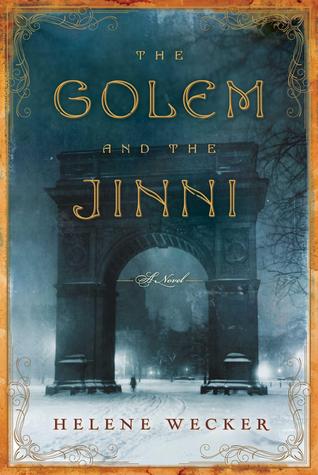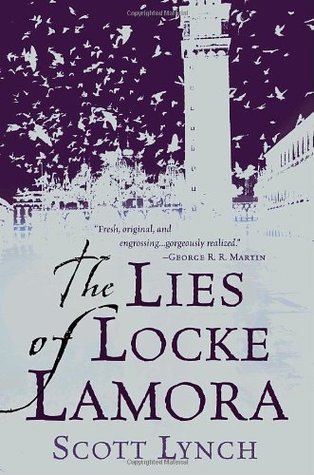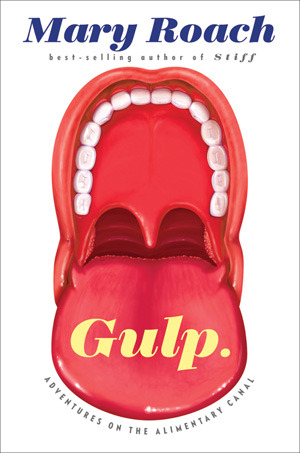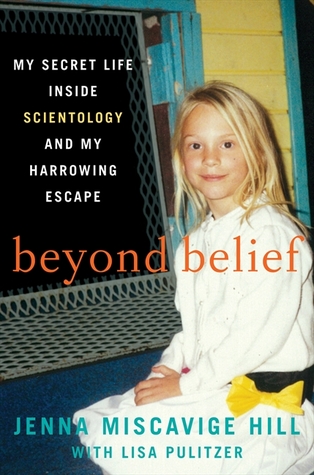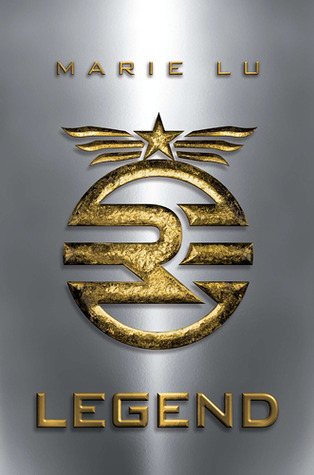#1137
Title: The Golem and the Jinni
Author: Helene Wecher
Year: 2013
Publisher: Harper
Pages: 496
Wednesday, October 15, 2014
The Lies of Locke Lamora (Gentleman Bastard #1)
#1136
Title: The Lies of Locke Lamora (Gentleman Bastard #1)
Author: Scott Lynch
Year: 2006
Publisher: Bantam Spectra
Pages: 499
Title: The Lies of Locke Lamora (Gentleman Bastard #1)
Author: Scott Lynch
Year: 2006
Publisher: Bantam Spectra
Pages: 499
Thursday, September 25, 2014
Asking: A 59-Minute Guide to Everything Board Members, Volunteers, and Staff Must Know to Secure the Gift, Newly Revised Edition
#1135
Title: Asking: A 59-Minute Guide to Everything Board Members, Volunteers, and Staff Must Know to Secure the Gift, Newly Revised Edition
Author: Jerold Panas
Year: 2013/2014
Publisher: Emerson & Church
Pages: 108
Title: Asking: A 59-Minute Guide to Everything Board Members, Volunteers, and Staff Must Know to Secure the Gift, Newly Revised Edition
Author: Jerold Panas
Year: 2013/2014
Publisher: Emerson & Church
Pages: 108
Wednesday, September 24, 2014
Escape from the Antarctic (Penguin Great Journeys)
#1134
Title: Escape from the Antarctic (Penguin Great Journeys)
Author: Ernest Shackleton
Year: 2007
Publisher: Penguin
Pages: 90
Country: Antarctica
Title: Escape from the Antarctic (Penguin Great Journeys)
Author: Ernest Shackleton
Year: 2007
Publisher: Penguin
Pages: 90
Country: Antarctica
Monday, September 15, 2014
Gulp: Adventures on the Alimentary Canal
#1133
Title: Gulp: Adventures on the Alimentary Canal
Author: Mary Roach
Year: 2013
Publisher: W. W. Norton
Pages: 352
Fun enough, though not as thorough as I'd have liked (e.g., virtually nothing about bile, the liver, the kidneys and other organs with metabolic function). It also kept promising to be gross, and it wasn't. I don't need it to be gross, but with that promise, I expect more about the composition of feces or urine-drinking cults or what have you.
Title: Gulp: Adventures on the Alimentary Canal
Author: Mary Roach
Year: 2013
Publisher: W. W. Norton
Pages: 352
Fun enough, though not as thorough as I'd have liked (e.g., virtually nothing about bile, the liver, the kidneys and other organs with metabolic function). It also kept promising to be gross, and it wasn't. I don't need it to be gross, but with that promise, I expect more about the composition of feces or urine-drinking cults or what have you.
Little Lake (Armenian Poetry XIX-XX Book 1)
Title: Little Lake (Armenian Poetry XIX-XX Book 1)
Author: Bedros Tourian
Translator: Alice Stone Blackwell
Year: 2012
Publisher: GS (Kindle)
Pages: 33
Country: Armenia (better exemplar)
I can't locate originals to see what Tourian's writing is really like, but this jangly translation in ABCB rhyme is jarring. The imagery seems trite and immature. Okay, he died early. However, he's apparently much-loved in Armenia, which might speak to the translation or might speak to classical Armenian poetic sensibilities.
Thursday, September 11, 2014
Wildwood (Wildwood Chronicles #1)
#1131
Title: Wildwood (Wildwood Chronicles #1)
Author: Colin Meloy
Illustrator: Carson Ellis
Year: 2011
Publisher: Balzer + Bray
Pages: 541
This low middle reader had its moments of charm and interest. However, it moves so slowly that it's almost unbearable.
Summary: Kind of Narnia, kind of Vinge's sapient dogs with guns from A Fire upon the Deep. In Oregon.
Title: Wildwood (Wildwood Chronicles #1)
Author: Colin Meloy
Illustrator: Carson Ellis
Year: 2011
Publisher: Balzer + Bray
Pages: 541
This low middle reader had its moments of charm and interest. However, it moves so slowly that it's almost unbearable.
Summary: Kind of Narnia, kind of Vinge's sapient dogs with guns from A Fire upon the Deep. In Oregon.
Tuesday, September 2, 2014
Beyond Belief: My Secret Life Inside Scientology and My Harrowing Escape
#1130
Title: Beyond Belief: My Secret Life Inside Scientology and My Harrowing Escape
Author: Jenna Miscavige Hill & Lisa Pulitzer
Year: 2013
Publisher: William Morrow/HarperCollins
Pages: 416
Yes, she whines, and her escape is more "nerve-wracking" than "harrowing," but Miscavige's story of the institutional abuses and coercion suffered by Sea Org members is consonant with those told by other ex-Scientologists. It's worth reading.
Title: Beyond Belief: My Secret Life Inside Scientology and My Harrowing Escape
Author: Jenna Miscavige Hill & Lisa Pulitzer
Year: 2013
Publisher: William Morrow/HarperCollins
Pages: 416
Yes, she whines, and her escape is more "nerve-wracking" than "harrowing," but Miscavige's story of the institutional abuses and coercion suffered by Sea Org members is consonant with those told by other ex-Scientologists. It's worth reading.
Friday, August 29, 2014
Lock In
#1129
Title: Lock In
Author: John Scalzi
Year: 2014
Publisher: Tor
Pages: 336
Best preceded by Scalzi's novella Unlocked, a Working/World War Z-style prequel that provides the history on which this novel rests. Lock In is in the style of his The Android's Dream and Agent to the Stars--clever badinage and snappy repartee dominate the dialogue, and characters work together with a synchrony that reminds one of Heinlein's ex-military men.
I read this in conjunction with articles on HIV, Hepatitis B and C, and Ebola, which was a good set of reflective readings. I recommend Sacks's Awakenings as a companion piece for heightened pleasure.
Title: Lock In
Author: John Scalzi
Year: 2014
Publisher: Tor
Pages: 336
Best preceded by Scalzi's novella Unlocked, a Working/World War Z-style prequel that provides the history on which this novel rests. Lock In is in the style of his The Android's Dream and Agent to the Stars--clever badinage and snappy repartee dominate the dialogue, and characters work together with a synchrony that reminds one of Heinlein's ex-military men.
I read this in conjunction with articles on HIV, Hepatitis B and C, and Ebola, which was a good set of reflective readings. I recommend Sacks's Awakenings as a companion piece for heightened pleasure.
Thursday, August 28, 2014
Legend (Legend, #1)
#1128
Title: Legend (Legend, #1)
Author: Marie Lu
Year: 2011
Publisher: Putnam Juvenile
Pages: 305
In the words of a different dystopian novel, doubleplusungood. Flaws include flat characters, continuity errors and omissions, action and plot points unbelievable even within this world's rules, sudden halts for staring at the beloved while bullets whiz past, and a peculiar obsession with silver buttons.
Instead of enumerating the problems with specific spoiler examples, though, I'll instead share the reading strategy that worked best for me: Think of this as a comic book. In comic books, people can indeed drop several stories or get "deep gash"es without death or deformity. Characters' actions occur because they do, and not necessarily in ways that are consistent with their personalities. The bad guys are caricatures, and stupid. However, the good guys' stupidity rarely registers as a problem, even if they're 15 years old and each thinks the other is bee-yoo-ti-ful. Plus, every silver button gets its own sparkly neoflect.
Title: Legend (Legend, #1)
Author: Marie Lu
Year: 2011
Publisher: Putnam Juvenile
Pages: 305
In the words of a different dystopian novel, doubleplusungood. Flaws include flat characters, continuity errors and omissions, action and plot points unbelievable even within this world's rules, sudden halts for staring at the beloved while bullets whiz past, and a peculiar obsession with silver buttons.
Instead of enumerating the problems with specific spoiler examples, though, I'll instead share the reading strategy that worked best for me: Think of this as a comic book. In comic books, people can indeed drop several stories or get "deep gash"es without death or deformity. Characters' actions occur because they do, and not necessarily in ways that are consistent with their personalities. The bad guys are caricatures, and stupid. However, the good guys' stupidity rarely registers as a problem, even if they're 15 years old and each thinks the other is bee-yoo-ti-ful. Plus, every silver button gets its own sparkly neoflect.
Tuesday, August 26, 2014
Rendezvous with Rama
#1127
Title: Rendezvous with Rama
Author: Arthur C. Clarke
Year: 1973/1974
Publisher: Ballantine
Pages: 276
Old-style male-type hard SF (which I like as a genre because there are so few female characters to be depicted stupidly). Rama is a gigantic Space Thing to be explored. Entertaining serious problems occur and clever solutions are found. The action moves along to a pleasing resolution that wraps up the story but leaves our frustration intact by not answering certain important questions about Rama. And a great punchline.
Title: Rendezvous with Rama
Author: Arthur C. Clarke
Year: 1973/1974
Publisher: Ballantine
Pages: 276
Old-style male-type hard SF (which I like as a genre because there are so few female characters to be depicted stupidly). Rama is a gigantic Space Thing to be explored. Entertaining serious problems occur and clever solutions are found. The action moves along to a pleasing resolution that wraps up the story but leaves our frustration intact by not answering certain important questions about Rama. And a great punchline.
Saturday, August 23, 2014
The Double Comfort Safari Club (No. 1 Ladies' Detective Agency #11)
#1126
Title: The Double Comfort Safari Club (No. 1 Ladies' Detective Agency #11)
Author: Alexander McCall Smith
Year: 2010
Publisher: Pantheon
Pages: 211
Although there's more literary subtlety to this one, I was more disappointed in it. I was ultimately puzzled by the title. "Double Comfort" suggested that the Safari Club might have something to do with Phuti Radiphuti's furniture store of the same name, but there is no connection. Nor are either of the camps called "Double Comfort," nor is there really either a safari or a club. In fact, little of the novel has anything to do with a safari or a safari club. At the plot level, it's more of a mishmash of little stories than anything else. Oh, and Phuti has a terrible accident, but it's treated with as little emotion or focus as... well, as these orphans who do so little and mean so little through so many installments.
Title: The Double Comfort Safari Club (No. 1 Ladies' Detective Agency #11)
Author: Alexander McCall Smith
Year: 2010
Publisher: Pantheon
Pages: 211
Although there's more literary subtlety to this one, I was more disappointed in it. I was ultimately puzzled by the title. "Double Comfort" suggested that the Safari Club might have something to do with Phuti Radiphuti's furniture store of the same name, but there is no connection. Nor are either of the camps called "Double Comfort," nor is there really either a safari or a club. In fact, little of the novel has anything to do with a safari or a safari club. At the plot level, it's more of a mishmash of little stories than anything else. Oh, and Phuti has a terrible accident, but it's treated with as little emotion or focus as... well, as these orphans who do so little and mean so little through so many installments.
Thursday, August 21, 2014
Gorillas among Us: A Primate Ethnographer's Book of Days
#1125
Title: Gorillas among Us: A Primate Ethnographer's Book of Days
Author: Dawn Prince-Hughes
Year: 2001
Publisher: University of Arizona
Pages: 153
Though many of the events are presented again in Prince-Hughes's Songs of the Gorilla Nation: My Journey through Autism, it's still enjoyable to read this less-polished, less-personal account of her time as an intern observing gorillas at the zoo. For a better picture and deeper narrative, read Songs of the Gorilla Nation as well or instead.
Title: Gorillas among Us: A Primate Ethnographer's Book of Days
Author: Dawn Prince-Hughes
Year: 2001
Publisher: University of Arizona
Pages: 153
Though many of the events are presented again in Prince-Hughes's Songs of the Gorilla Nation: My Journey through Autism, it's still enjoyable to read this less-polished, less-personal account of her time as an intern observing gorillas at the zoo. For a better picture and deeper narrative, read Songs of the Gorilla Nation as well or instead.
Wednesday, August 20, 2014
The Demon Under the Microscope: From Battlefield Hospitals to Nazi Labs, One Doctor's Heroic Search for the World's First Miracle Drug
#1124
Title: The Demon Under the Microscope: From Battlefield Hospitals to Nazi Labs, One Doctor's Heroic Search for the World's First Miracle Drug
Author: Thomas Hager
Year: 2006
Publisher: Harmony
Pages: 352
An interesting and useful account of the discovery and history of the sulfa drugs. It suffers from three major flaws: Skipping around in time, which makes the sequences hard to follow; repetitive information; and an overly dumbed-down presentation of not-very-technical material. It's also vague on the extent of IG Farben's Holocaust atrocities--they're mentioned in brief, but the overall attitude seems a bit apologist and dismissive.
Title: The Demon Under the Microscope: From Battlefield Hospitals to Nazi Labs, One Doctor's Heroic Search for the World's First Miracle Drug
Author: Thomas Hager
Year: 2006
Publisher: Harmony
Pages: 352
An interesting and useful account of the discovery and history of the sulfa drugs. It suffers from three major flaws: Skipping around in time, which makes the sequences hard to follow; repetitive information; and an overly dumbed-down presentation of not-very-technical material. It's also vague on the extent of IG Farben's Holocaust atrocities--they're mentioned in brief, but the overall attitude seems a bit apologist and dismissive.
The Chrysalids
#1123
Title: The Chrysalids
Author: John Wyndham
Year: 1955
Publisher: Michael Joseph
Pages: 200
A reasonably interesting post-apocalyptic novel, set in Canada for a change of scenery. One must accept the premise that the presumed nuclear devastation could cause many non-fatal mutations, but that's the starting point for many books in this genre.
I enjoyed the culture and world building, though Wyndham seems not to have made the best use of it. For example, I would expect a protagonist, or at least a foil character, to experience more moral qualms about the group's actions, which would have increased exploration of the idea, and the internal threat. Several characters appear to be simply discarded when no longer useful to the narrative.
The Wikipedia entry currently identifies "Sealand" as New Zealand. Unless Wyndham has confirmed this, I would have thought it was Zeeland. The Netherlands makes more sense for the distance traveled in a helicopter, though New Zealand's anti-nuclear policies make it culturally plausible.
A brief speech near the end caused me serious deja vu, since Jefferson Airplane cribbed/paraphrased it in "Crown of Creation":
In loyalty to their kind
They cannot tolerate our minds.
In loyalty to our kind
We cannot tolerate their obstruction!
Title: The Chrysalids
Author: John Wyndham
Year: 1955
Publisher: Michael Joseph
Pages: 200
A reasonably interesting post-apocalyptic novel, set in Canada for a change of scenery. One must accept the premise that the presumed nuclear devastation could cause many non-fatal mutations, but that's the starting point for many books in this genre.
I enjoyed the culture and world building, though Wyndham seems not to have made the best use of it. For example, I would expect a protagonist, or at least a foil character, to experience more moral qualms about the group's actions, which would have increased exploration of the idea, and the internal threat. Several characters appear to be simply discarded when no longer useful to the narrative.
The Wikipedia entry currently identifies "Sealand" as New Zealand. Unless Wyndham has confirmed this, I would have thought it was Zeeland. The Netherlands makes more sense for the distance traveled in a helicopter, though New Zealand's anti-nuclear policies make it culturally plausible.
A brief speech near the end caused me serious deja vu, since Jefferson Airplane cribbed/paraphrased it in "Crown of Creation":
In loyalty to their kind
They cannot tolerate our minds.
In loyalty to our kind
We cannot tolerate their obstruction!
Breakfast at Tiffany's
#1122
Title: Breakfast at Tiffany's
Author: Truman Capote
Year: 1958
Publisher: Random House
Pages: ~75
Holly Golightly bears a great superficial resemblance to Isherwood's Sally Bowles, though Sally is considerably less histrionic (and therefore, more genuinely tortured about who she is and what to make of her life). There's plenty of back story here, some of it quite desperate if examined out of the context of Capote's deceptively breezy story.
I am afraid that the colonoscopy prep GoLYTELY has forever affected my associations to this surname.
Title: Breakfast at Tiffany's
Author: Truman Capote
Year: 1958
Publisher: Random House
Pages: ~75
Holly Golightly bears a great superficial resemblance to Isherwood's Sally Bowles, though Sally is considerably less histrionic (and therefore, more genuinely tortured about who she is and what to make of her life). There's plenty of back story here, some of it quite desperate if examined out of the context of Capote's deceptively breezy story.
I am afraid that the colonoscopy prep GoLYTELY has forever affected my associations to this surname.
Thursday, August 14, 2014
Burning Paradise
#1121
Title: Burning Paradise
Author: Robert Charles Wilson
Year: 2013
Publisher: Tom Doherty (Tor)
Pages: 319
As a physical book, nice cover image, nice paper quality, very readable serifed typeface.
I think I've read all of Wilson's published science fiction. I tend to get the book when it becomes available, then save it until I'm ready for a treat. Wilson has never disappointed. Even his thinner works include interesting science and moral or philosophical concerns that show the effects of human decisions on the broader society and culture, as well as on the characters.
This question of what will happen if one road is taken rather than another is central to this story at several levels. Snippets from Frost's "The Road Not Taken" appear in a character's speculations. Through the narrative, characters face difficult choices, as well as concerns about whether their actions are their own or have been manipulated by an alien entity.
A common strategy for Wilson, especially in his earlier work, is to use a Jungian story frame where something alien erupts from the collective unconscious (this, I think, is the quality that gives his speculative fiction an air of horror), interacts with humans or humanity, then disappears. Infrequently, we see the story from the alien's point of view. Usually, though, it's the humans who need to incorporate this eruption/disruption and figure out how and whether it's possible to regain a semblance of normalcy. As a character muses in A Bridge of Years,
This conflict affects how characters see each other and their assumptions about who belongs in what group(s) with whom. As in Darwinia, which this novel mirrors and distorts, there are two sets of alien assertions about what is happening and what the humans should do. In Darwinia, it's easier to determine which alien project is "good." It's a lot harder here.
As in most of Wilson's work, some protagonists must make decisions that include both local effects (such as endangering or saving their family and friends) and societal ones (often, as here, related to humanity's free will). As elsewhere in some of his recent work, Wilson's aliens are portrayed in contrast to this. They are group entities, loyal to their collective goals but egoless and without loyalty or commitment to smaller groups or themselves as individuals, except insofar as they are necessary units in the collective. While Star Trek's Borg come to mind, I think Ender's Hive Queen is more to the point (and there may be a nod to Card here--the character Ethan Iverson's treatise on the aliens, The Fisherman and the Spider, immediately evokes Ender's similarly-titled The Hive Queen and The Hegemon also focused on an archetypal alien and human).
As is a frequent trope in Wilson's novels, a male character expresses a wish to be allowed and helped to die. In this case, it's not because he wants to get out of the action, but because it's time. This is a subtle difference, but may speak to the maturation of this recurrent element.
Structurally, I'd have wished for a little more time and unfolding of ideas in the last fifth of the book. I found myself pulled along by the urgency of the climactic events, but they weren't as satisfying to read as they might have been with a little more preparation, since I had to go back after finishing to work out some of the motives and reasons that compelled the action. Wilson refuses the reader a happy ending in that the moral ambiguities and difficult choices made by the characters are not easily settled on either a personal or societal level. Choices are not clean, and we live with the consequences. That's not a cowboys-in-space ending, but a realistic one.
This works well as an alternate history. The differences are usually subtle but matter-of-fact. Since our world is closer to one of the potential outcomes of the characters' actions, it's a fun comparison.
Not Wilson's best, but I'm not sure he has a worst. A fine novel with an interesting premise, brought to a satisfyingly troubling and ambivalent conclusion.
Fun fact: Searching online for the quote above (which I didn't find and had to resort to skimming the book), I did learn that numinous and linguini both have eight letters. Does it mean anything? You tell me.
Title: Burning Paradise
Author: Robert Charles Wilson
Year: 2013
Publisher: Tom Doherty (Tor)
Pages: 319
As a physical book, nice cover image, nice paper quality, very readable serifed typeface.
I think I've read all of Wilson's published science fiction. I tend to get the book when it becomes available, then save it until I'm ready for a treat. Wilson has never disappointed. Even his thinner works include interesting science and moral or philosophical concerns that show the effects of human decisions on the broader society and culture, as well as on the characters.
This question of what will happen if one road is taken rather than another is central to this story at several levels. Snippets from Frost's "The Road Not Taken" appear in a character's speculations. Through the narrative, characters face difficult choices, as well as concerns about whether their actions are their own or have been manipulated by an alien entity.
A common strategy for Wilson, especially in his earlier work, is to use a Jungian story frame where something alien erupts from the collective unconscious (this, I think, is the quality that gives his speculative fiction an air of horror), interacts with humans or humanity, then disappears. Infrequently, we see the story from the alien's point of view. Usually, though, it's the humans who need to incorporate this eruption/disruption and figure out how and whether it's possible to regain a semblance of normalcy. As a character muses in A Bridge of Years,
It had never occurred to her that people who had shared experiences like this--people who were kidnapped by flying saucers or visited by ghosts--would have to deal with anything as prosaic as dinner. An encounter with the numinous, followed by, say, linguine. (226)This process parallels the Piagetian choices of accommodation versus assimilation. In the face of new experiences, do we jam our understanding into a concept we already have, or do we shift paradigms? Wilson's characters typically need to shift their understanding of the world to include these previously unconscious phenomena and their effects on the characters' human reality. In Burning Paradise, Wilson plays with this tension as characters struggle to figure out which plausible story is most likely to be true, as well as what to do about it.
This conflict affects how characters see each other and their assumptions about who belongs in what group(s) with whom. As in Darwinia, which this novel mirrors and distorts, there are two sets of alien assertions about what is happening and what the humans should do. In Darwinia, it's easier to determine which alien project is "good." It's a lot harder here.
As in most of Wilson's work, some protagonists must make decisions that include both local effects (such as endangering or saving their family and friends) and societal ones (often, as here, related to humanity's free will). As elsewhere in some of his recent work, Wilson's aliens are portrayed in contrast to this. They are group entities, loyal to their collective goals but egoless and without loyalty or commitment to smaller groups or themselves as individuals, except insofar as they are necessary units in the collective. While Star Trek's Borg come to mind, I think Ender's Hive Queen is more to the point (and there may be a nod to Card here--the character Ethan Iverson's treatise on the aliens, The Fisherman and the Spider, immediately evokes Ender's similarly-titled The Hive Queen and The Hegemon also focused on an archetypal alien and human).
As is a frequent trope in Wilson's novels, a male character expresses a wish to be allowed and helped to die. In this case, it's not because he wants to get out of the action, but because it's time. This is a subtle difference, but may speak to the maturation of this recurrent element.
Structurally, I'd have wished for a little more time and unfolding of ideas in the last fifth of the book. I found myself pulled along by the urgency of the climactic events, but they weren't as satisfying to read as they might have been with a little more preparation, since I had to go back after finishing to work out some of the motives and reasons that compelled the action. Wilson refuses the reader a happy ending in that the moral ambiguities and difficult choices made by the characters are not easily settled on either a personal or societal level. Choices are not clean, and we live with the consequences. That's not a cowboys-in-space ending, but a realistic one.
This works well as an alternate history. The differences are usually subtle but matter-of-fact. Since our world is closer to one of the potential outcomes of the characters' actions, it's a fun comparison.
Not Wilson's best, but I'm not sure he has a worst. A fine novel with an interesting premise, brought to a satisfyingly troubling and ambivalent conclusion.
Fun fact: Searching online for the quote above (which I didn't find and had to resort to skimming the book), I did learn that numinous and linguini both have eight letters. Does it mean anything? You tell me.
Wednesday, August 13, 2014
Moby-Dick; or, The Whale
#1120
Title: Moby-Dick; or, The Whale
Author: Herman Melville
Illustrator: Rockwell Kent
Year: 1851
Publisher: ICU Publishing/Kindle
Pages: 669
I've been reading classics electronically or on audiobook to fill in the gaps in my non-English Literature-major background. A lot of them have sermonizing sections. I was shocked to re-read Robinson Crusoe again and see how much religious discourse it includes. I think when we're younger, we blip right over the philosophizing, especially if the book is required reading. Moby-Dick, while rich in this regard, manages to incorporate the material effectively. It's funny and astute. I had deja vu for the first chunk--I'm not sure if I might have read the first chapters at some point, or read something where this was part of a pastiche, or just hung around New Bedford too much as a younger person.
Lemur 866 on The Straight Dope suggests reading as if Ishmael is a blogger. Some days he'll tell you about his friend, while some he'll talk about religion, and on others, the crafts and practices associated with whaling. This works for me (though I also see the novel as using both documentary and natural and philosophical sciences approaches, a la Justine, 120 Days of Sodom, The Golden Bough, or any natural history of its era).
Ishmael's many descriptions and reports serve two functions: To establish verisimilitude (i.e., that this is a factual report), and as a contrast to Ahab's monomaniacal obsession--Ishmael has wide-ranging conversations, is interested in all aspects of whaling, and has a relationship with the reader, whereas Ahab only wants to kill Moby-Dick. In this regard, it makes sense that Ishmael as a character fades from importance in the story, which increasingly focuses on Ahab's all-encompassing obsession. In a way, Ahab is already consumed and dead, while Ishmael, who will live to tell the tale, is engaged and alive.
I enjoyed this well-performed audiobook, and followed along in the linked Kindle edition for the pleasure of Kent Rockwell's illustrations (of which the below is a wonderful example).

Title: Moby-Dick; or, The Whale
Author: Herman Melville
Illustrator: Rockwell Kent
Year: 1851
Publisher: ICU Publishing/Kindle
Pages: 669
I've been reading classics electronically or on audiobook to fill in the gaps in my non-English Literature-major background. A lot of them have sermonizing sections. I was shocked to re-read Robinson Crusoe again and see how much religious discourse it includes. I think when we're younger, we blip right over the philosophizing, especially if the book is required reading. Moby-Dick, while rich in this regard, manages to incorporate the material effectively. It's funny and astute. I had deja vu for the first chunk--I'm not sure if I might have read the first chapters at some point, or read something where this was part of a pastiche, or just hung around New Bedford too much as a younger person.
Lemur 866 on The Straight Dope suggests reading as if Ishmael is a blogger. Some days he'll tell you about his friend, while some he'll talk about religion, and on others, the crafts and practices associated with whaling. This works for me (though I also see the novel as using both documentary and natural and philosophical sciences approaches, a la Justine, 120 Days of Sodom, The Golden Bough, or any natural history of its era).
Ishmael's many descriptions and reports serve two functions: To establish verisimilitude (i.e., that this is a factual report), and as a contrast to Ahab's monomaniacal obsession--Ishmael has wide-ranging conversations, is interested in all aspects of whaling, and has a relationship with the reader, whereas Ahab only wants to kill Moby-Dick. In this regard, it makes sense that Ishmael as a character fades from importance in the story, which increasingly focuses on Ahab's all-encompassing obsession. In a way, Ahab is already consumed and dead, while Ishmael, who will live to tell the tale, is engaged and alive.
I enjoyed this well-performed audiobook, and followed along in the linked Kindle edition for the pleasure of Kent Rockwell's illustrations (of which the below is a wonderful example).
Subscribe to:
Comments (Atom)
